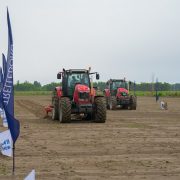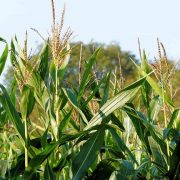UPA and COAG highlight 2016 as year of high production but low agricultural prices
In its usual year-end balance sheet, the agricultural organizations COAG and UPA have agreed to value 2016 as a year that has been characterized by a significant increase in production (which has grown in value to € 46.487 billion), as opposed to agricultural prices, which have been experiencing a general fall that COAG estimates at 4% and which, according to UPA, is the main cause, together with the inaction and lack of support from the political institutions, the coming economic choke suffering from food producers in Spain.
In its annual balance sheet, UPA draws attention to the political break “which has slowed much needed reforms for the Spanish countryside”
According to COAG, the increase of 5.1% in the 2016 income, according to the first estimate of the agricultural income published by the Ministry of Agriculture and Fisheries, Food and Environment (MAPAMA), is mainly due to an increase of production (6.8% in vegetable production, with a significant increase in olive production (69%) and 5.2% in livestock production). In this line, his secretary general, Miguel Blanco, points out that such data can be deceptive, since the increase in agricultural income “is a direct result of higher production and not so much better prices perceived by the farmer and cattle.” In fact, and according to this organization, agricultural prices have fallen by 3.2% in agricultural crops and 4.6% in livestock sectors. By sectors, can be highlighted the declines in forage plants (-11.9%), vegetables (-10.9%), cereals (-10.9%), olive oil (-5.1%) and industrial plants (3.7%). In livestock, 2016 leaves a general fall in all sectors: eggs (-14.2%), poultry (-12.7%), milk (-5.4%), sheep-goat (-5.0%), porcine (-1.3%) and cattle (-0.4%).
As positive data, COAG points out that, for the first time in the last decade, agricultural assets increase (+ 1.6%) and the price of the main inputs (seeds/nursery plants, energy, fertilizers, phytosanitary products, animal feed, veterinary expenses, etc.).
COAG draws attention to the fact that, since 2003 (the year of the reform of the Common Agricultural Policy (CAP)), the agricultural sector has left behind 21% of its income
Meanwhile, UPA highlights the important contribution of the agricultural sector to job creation in 2016, down 8.36% the level of unemployed in the sector between January and November 2016 compared to the same period last year. Evidence for UPA of the strategic value of the primary sector in the generation of wealth and employment in areas and regions “especially in need” of activity. For all of this, the organization is particularly concerned about the lack of progress in solving the imbalances in the agri-food chain, pursuing abuses and practices such as selling at a loss, which the sector has continued to denounce and, in that sense, it has asked the Administrations that 2017 will not be another “lost year”, after almost three years of operation of the Law of the Food Chain.
UPA stands out among the biggest problems of the agricultural sector in 2016 the serious increase in insurance, problems with the CAP and the crisis of sectors such as dairy, rabbit and the fruit of bone
This organization has also drawn attention to the loss of calls for support to rural women and young farmers and ranchers, which are fundamental for advancing equality and generational change, which stands out as two of the main challenges for the Spanish rural world in 2017.
As regards COAG, this organization points out among the many agrarian priorities for 2017 the renewal of the current Law 19/95 on the Modernization of Farms through the Statute of Social and Professional Agriculture; promote measures to support the installation of young farmers and the creation of the Observatory of Costs and Markets of Inputs to increase the monitoring of the oligopolies that control the inputs of the sector (energy, fertilizers, feed, seeds, etc.) and avoid thus unjustifiably high speculation and costs for farmers and ranchers.
It also proposes improvements in the Food Chain Law, such as the increase and optimization of the resources of the Food Information and Control Agency (AICA), the extension of compulsory contracts to all operations in the chain, the introduction of “selling at a loss” as a malpractice abusive business practice, expanding the role of mediator and prohibiting promotional campaigns based on the gift of basic foods (primary products or products packaged as milk or olive oil) which mislead the price and real value of such products.
Other claims included in COAG’s annual balance sheet are: increasing the state budget allocation for agricultural insurance, at least up to 2007-2011 levels, to reduce the cost of policies and contribute to the universalization of insurance; MAPAMA to work in Brussels for a new orientation of the CAP more social and professional, giving priority to support to real agricultural professionals; the rejection of the EU-US Transatlantic Trade and Investment Agreement (TTIP), which qualifies as a “threat to the European model of agriculture and food, based on quality, sustainability and diversity”; and the drive to digital transformation and big data in the field.
Sources: COAG and UPA
















